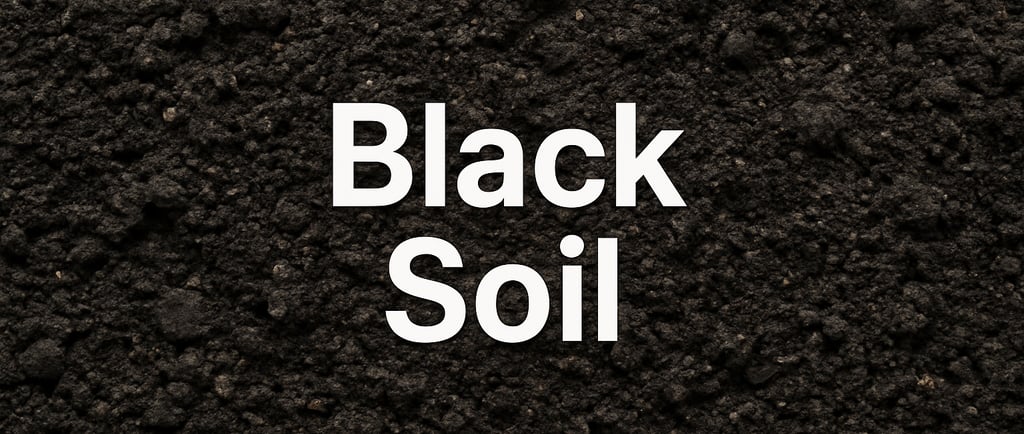"Black Soil: The Secret to Rich Harvests and Healthy Crops"
Black soil, also known as regur soil, is a rich and fertile type of soil predominantly characterized by its dark color, which typically results from a high concentration of organic matter and minerals. This soil type is primarily found in regions with volcanic activity or areas that have experienced significant erosion, making it particularly beneficial for agriculture.
SOIL HEALTH & FERTILITY
8/16/20258 min read


What is Black Soil?
Black soil, also known as regur soil, is a rich and fertile type of soil predominantly characterized by its dark color, which typically results from a high concentration of organic matter and minerals. This soil type is primarily found in regions with volcanic activity or areas that have experienced significant erosion, making it particularly beneficial for agriculture. The unique color of black soil is indicative of its carbon content, which plays a crucial role in sustaining nutrient levels necessary for plant growth.
Black soil is predominantly found in specific regions, with notable areas including parts of India, Africa, and the United States. In India, it mainly covers the Deccan Plateau, extending across states such as Maharashtra, Madhya Pradesh, Karnataka, and Gujarat. The geography of these areas, with their semi-arid climate, contributes to the formation of black soil, enabling it to develop unique characteristics that differentiate it from other soil types.
The formation process of black soil involves the weathering of basalt rock, which is abundant in the aforementioned regions. When basalt weathers, it releases important nutrients and minerals, such as calcium, magnesium, and potassium, vital for plant health. Furthermore, black soil exhibits a clayey texture, which enhances its water retention capacity, allowing crops to thrive even in lower rainfall conditions.
Its mineral composition is uniquely structured to support a diverse range of agricultural activities. Black soil not only possesses excellent moisture-retaining capabilities but also has a significant capacity for expansion and contraction. This characteristic enables the soil to maintain aeration and drainage, which are essential for root development. Consequently, these properties make black soil particularly suitable for growing a variety of crops, thereby reinforcing its importance in agriculture. Overall, black soil stands out as a critical resource for sustainable farming and ecological balance.
Composition of Black Soil
Black soil, also known as regur soil, is highly regarded for its rich composition and fertility, making it particularly conducive for agricultural purposes. The primary components of black soil include organic matter, clay, and essential minerals such as calcium, magnesium, and iron. These elements play a significant role in determining the soil's structure, texture, and overall fertility.
Organic matter is a critical component of black soil. It is derived from the decomposition of plant and animal residues, which enriches the soil with essential nutrients, enhancing its fertility. A higher content of organic matter improves the soil's capacity to retain moisture, making it advantageous during dry seasons. This retention capability is crucial, especially in regions where irrigation is limited.
The texture of black soil is predominantly clayey, which contributes to its distinctive characteristics. Clay particles create a dense structure that prevents excessive drainage and retains nutrients effectively. This texture allows the soil to hold onto water, which is vital during the growth stages of crops. The high clay content also facilitates the binding of nutrients, supporting optimum crop growth by making essential minerals more accessible to plant roots.
In terms of mineral composition, black soil is rich in essential nutrients necessary for plant health. Calcium and magnesium play critical roles in enzyme activity and photosynthesis, while iron is vital for synthesizing chlorophyll. The presence of these minerals contributes significantly to the overall fertility of the soil, promoting robust crop development and high yields. The balanced chemical composition of black soil makes it particularly suitable for growing a variety of crops, including cotton, sorghum, and soybean, which thrive in such nutrient-rich environments.
Importance of Black Soil in Agriculture
Black soil, also known as Regur soil, plays a crucial role in the agricultural landscape due to its unique physical and chemical properties. Characteristically rich in clay minerals, this soil has an excellent ability to retain moisture, making it particularly beneficial for various crops. The high moisture retention capacity ensures that plants receive adequate hydration, even during dry spells, thereby significantly impacting crop growth and yield. This characteristic is especially advantageous in regions with inconsistent rainfall patterns.
Moreover, black soil is inherently fertile due to its high content of organic matter and essential nutrients, including nitrogen, phosphorus, and potassium. These nutrients are vital for plant development, promoting robust growth and higher yields. The nutrient-rich environment not only supports the cultivation of staple crops like cotton, soybean, and sorghum, but also enhances the potential for diverse cropping systems, allowing farmers to practice crop rotation effectively. Crop rotation is pivotal in maintaining soil health, preventing nutrient depletion, and managing pest populations.
In terms of sustainable agriculture, black soil contributes to food security by providing consistent yields and ensuring reliable agricultural productivity over time. Its ability to support various crops while maintaining ecological balance makes it an invaluable component of sustainable farming practices. Protecting and maintaining the health of black soil is essential for preserving its agronomic qualities. Additionally, its structure promotes biodiversity by offering ideal conditions for beneficial organisms, which play a significant role in soil fertility and pest control.
Maintaining the ecosystem around black soil is crucial not just for agricultural success but also for environmental sustainability. By recognizing and leveraging the importance of black soil, we can foster practices that promote long-term agricultural viability and contribute to the global food supply while enhancing ecological health.
Advantages of Using Black Soil
Black soil, also known as regur soil, is highly regarded in agricultural practices for several compelling reasons. One of the primary advantages of black soil is its exceptional moisture retention capacity. Due to its clayey nature, it can hold considerable amounts of water, which is critical during dry spells. This property not only ensures that crops receive adequate hydration but also encourages deeper root systems, allowing plants to access nutrients more effectively.
Moreover, black soil is rich in essential nutrients, particularly calcium, magnesium, and potassium. This nutrient richness plays a crucial role in supporting the healthy growth of various crops. The soil's organic matter promotes microbial activity, which further enhances nutrient availability for plants. This characteristic makes black soil particularly beneficial for cultivating cash crops such as cotton, which thrive in nutrient-dense environments. As a result, farmers often experience increased crop yields when using this fertile soil.
Another significant advantage of black soil is its capacity to support a diverse range of crops. This versatility allows farmers to experiment with various farming techniques and crop rotation strategies, leading to an improved farming ecosystem. Additionally, the adaptability of crops cultivated in black soil can reduce the overall risk associated with farming, as diversifying crop yields mitigates losses from market fluctuations or adverse weather conditions.
Lastly, the economic benefits associated with the use of black soil cannot be overlooked. Increased crop yields translate into higher profits for farmers, while the soil's nutrient-rich profile lowers the dependency on chemical fertilizers. This reduces farming costs and promotes sustainability within agricultural practices. The combination of enhanced productivity and reduced input expenses positions black soil as a valuable resource for contemporary farming.
Crops Best Suited for Black Soil
Black soil, also known as Regur soil, is highly regarded for its unique properties that promote agricultural productivity. This type of soil is particularly rich in moisture retention and has a high clay content, making it ideal for cultivating specific crops that thrive under such conditions. One of the standout crops commonly grown in black soil is cotton, which is often hailed as the "white gold" of India. The soil's excellent moisture-holding capacity, combined with its nutrient-rich makeup, provides an optimal growing environment for cotton plants, facilitating healthy growth and enhanced cotton yield.
In addition to cotton, various pulses such as chickpeas and pigeon peas are well-suited for black soil cultivation. Pulses require less external input, and the nutrient availability in black soil supports the growth of these legumes effectively. The soil's structure allows for better aeration while retaining adequate moisture, which is essential for the successful growth of these crops, often leading to robust yields.
Another crop that thrives in black soil is soybeans. The nutrient-dense composition and favorable drainage properties of this soil type are conducive to the growth of soybeans. This legume not only utilizes nitrogen efficiently but also enhances soil fertility through its nitrogen-fixing capabilities, further benefiting the agricultural ecosystem.
Moreover, groundnuts and a variety of other oilseeds also find a suitable habitat in black soil, thanks to its excellent water retention and fertility attributes. The soil's physical characteristics enable crop roots to penetrate easily, thereby maximizing nutrient absorption. Overall, the selection of crops to cultivate in black soil should consider its unique properties, allowing farmers to achieve sustainable agricultural practices while ensuring high productivity.
Challenges in Managing Black Soil
Black soil, known for its rich nutrient content and high moisture retention capacity, presents several challenges in its management that can negatively impact agricultural productivity. One of the most pressing issues is erosion, which can be exacerbated by excessive tillage and improper land use practices. The absence of vegetation cover can lead to the detachment and transport of soil particles, resulting in a significant loss of topsoil. This not only diminishes the soil’s fertility but also contributes to the degradation of the surrounding ecosystem.
Nutrient depletion is another challenge faced by farmers managing black soil. While this soil type is initially rich in nutrients such as nitrogen, phosphorus, and potassium, continuous cropping without adequate replenishment can lead to nutrient deficiencies. This situation is aggravated when mono-cropping practices are employed, where the same crop is cultivated repeatedly. Over time, the soil becomes less productive, leading to reduced agricultural yield. Implementing strategies for maintaining nutrient levels is essential for sustainable black soil management.
Improper agricultural practices, such as over-reliance on chemical fertilizers and pesticides, can further deteriorate black soil health. These inputs may lead to contamination, affecting soil microbial life and diminishing soil structure. In contrast, sustainable practices like crop rotation and the incorporation of organic amendments can promote soil health. Crop rotation helps to break pest cycles and improves soil fertility, while organic amendments such as compost enrich the soil with essential nutrients and enhance its water-holding capacity.
To effectively manage black soil, it is crucial to adopt practices that prioritize sustainability. By addressing issues such as erosion, nutrient depletion, and improper agricultural practices, farmers can ensure the long-term productivity and health of black soil. Implementing these sustainable strategies will not only benefit farmers but also support the environmental integrity of the regions where black soil is found.
Conclusion: The Future of Black Soil in Sustainable Agriculture
Throughout this blog post, we have explored the essential aspects of black soil—its unique composition, significant importance, notable advantages, and the best crops suited for cultivation. As a vital component of sustainable agriculture, black soil's high fertility and moisture-retaining capacity make it an invaluable resource for food production. The intricate ecosystem supported by black soil not only fosters healthy plant growth but also contributes to the overall health of our environment.
Black soil, often referred to as 'Regur soil,' contains a rich mix of essential nutrients that are crucial for various crops. The presence of minerals like calcium, magnesium, and organic matter not only enhances soil structure but also boosts agricultural yield. Recognizing the indispensable role that black soil plays in sustaining agriculture is imperative as we face the challenges of climate change and food security. The preservation of this natural resource is paramount for future generations who rely on fruitful harvests.
Ancillary to its agricultural significance, black soil also supports biodiversity, contributing to a balanced ecosystem. The adoption of best practices such as crop rotation, reduced tillage, and the judicious use of fertilizers can help maintain the health and productivity of black soil. As stewards of the land, it is crucial for farmers and agricultural practitioners to engage in sustainable practices that not only improve soil health but also ensure the longevity of this vital resource.
In conclusion, the future of black soil in sustainable agriculture relies heavily on our collective efforts to understand, protect, and enhance its capabilities. By recognizing its value and adhering to sustainable agricultural practices, we can ensure that black soil continues to support food systems and environmental integrity for years to come.


"Boosting Crop Growth With Nature's Power"
Contact Us:
E Mail: support@frosil.com
Customer Care: +91 8329592991
FROSIL © 2025. All rights reserved.


'Frosil' is a fertilizer manufacturer committed to enhancing soil health and crop yields. We provide high-quality, eco-friendly products that support sustainable agriculture and help farmers achieve optimal results.
Registered Office: Gat No.96, Near Krushnai Hospital, Tandali. Tal- Shirur, Dist- Pune.
